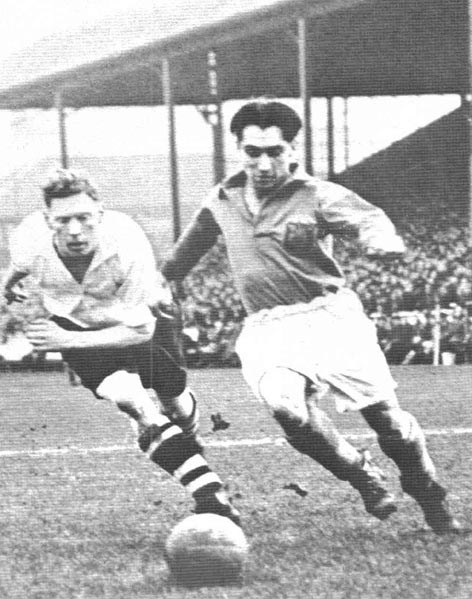

Williams: Harold
1949-1957
(Player Details)
Winger
Born: Briton Ferry, Glamorgan: 17-06-1924
Debut: Queens Park Rangers (h): 20-08-1949
5’4” 8st 11lb (1953)
As a boy Williams was rejected by Swansea Town after trials, but he made War-time guest
appearances for Belfast Celtic and Cliftonville. When he was demobbed from the Royal Navy,
where he served on destroyers, he signed for Briton Ferry Athletic and joined Newport County
in November 1946. He first came to the attention of Leeds United when he roasted them in an
FA Cup-tie as a Newport player in January 1949. The Welsh minnows pulled off a shock 3-1 win
at Elland Road, inspired by Williams, who had been up in the early hours of the day to
complete his milkround before travelling to Leeds. Major Buckley paid £12,000 for him in
July 1949 which was quite a high fee at the time. He scored seventeen goals in seventy-five
League games while at Somerton Park. The nippy winger with the size five and a half boots
could dribble with both feet and was therefore employed on either wing. It was his ability
to switch wings at will that made him such a creative and talented player who made many
goals for Len Browning, and later John Charles, with his pinpoint crosses as well as being a
regular scorer himself. Initially he played on the left wing for Leeds as the mercurial
David Cochrane was operating on the right and was an integral part of the fine Leeds side of
1949/50, which made United's best every run In the F.A. Cup, only to fall to the mighty
Arsenal at Highbury in the Sixth Round after a titanic tussle. The team came very close to
gaining promotion, and but for a terrible start to the season, in which they won just one
game in eleven, they most surely would have. The twinkletoed Welshman was one of the reasons
for their success and tied many a class full back in knots, including England's Alf Ramsey.
With ten League goals, he finished second behind Frank Dudley, who had twelve in the
goalscoring charts that season and he added another three and Dudley four in the F.A. Cup.
With Williams on the right flank but easily switching to the left, United had a succession
of wingers in Peter Harrison and George Meek who also had the ability to operate on both
flanks and they were the Leeds wingers until Jackie Overfield established himself on the
left flank in the promotion season of 1955-56. Williams already had two Welsh caps when he
joined Leeds, having represented his country on 9th March 1949 in a 2-0 win over Northern
Ireland at Windsor Park in Belfast and in Bern on 26th May 1949 when the Welsh suffered a
4-0 defeat at the hands of Switzerland. He added a couple more during his stay at Elland
Road, playing in a 0-0 draw with Northern Ireland at the Racecourse Ground in Wrexham on 8th
March 1950, in the game John Charles made his Welsh International debut, and a 3-1 defeat by
Scotland at Ninian Park Cardiff on 21st October 1950. A regular in the Leeds team, he fought
back from a broken leg sustained in a game against Everton at Goodison Park on 22nd November
1952 to reclaim his first team place for the start of the 1953-54 season. He was able to
re-establish his role as provider of accurate crosses for the rampant John Charles as the
team produced an avalanche of goals, with Charles setting the Leeds goalscoring record of
forty-two goal (in only thirty-nine games) and Williams chipping in eight goals to be joint
third goalscorer, with Bob Forrest, as Albert Nightingale notched seventeen. The following
season saw promotion for United, but the talented winger's career was coming to a close and,
although he scored twice in nineteen games, George Meek and Jackie Overfield finished the
season as the established wingers and were to be the ones to grace the First Division and
supply the ammunition for Charles, who scored thirty eight times in his forty games in his
first season in the top flight. In March 1957 Williams returned to Newport County but left
Somerton Park after only three months and just ten League games to join Bradford Park Avenue,
where his career ended after a succession of injuries and fifteen League appearances. He
moved into the licence trade, running the Railway Pub at Beeston, near Elland Road, and a
pub in Gildersome before retiring in 1986. He, John Charles and Jimmy Dunn were firm friends
and all three regularly attended all United’s games at Elland Road.